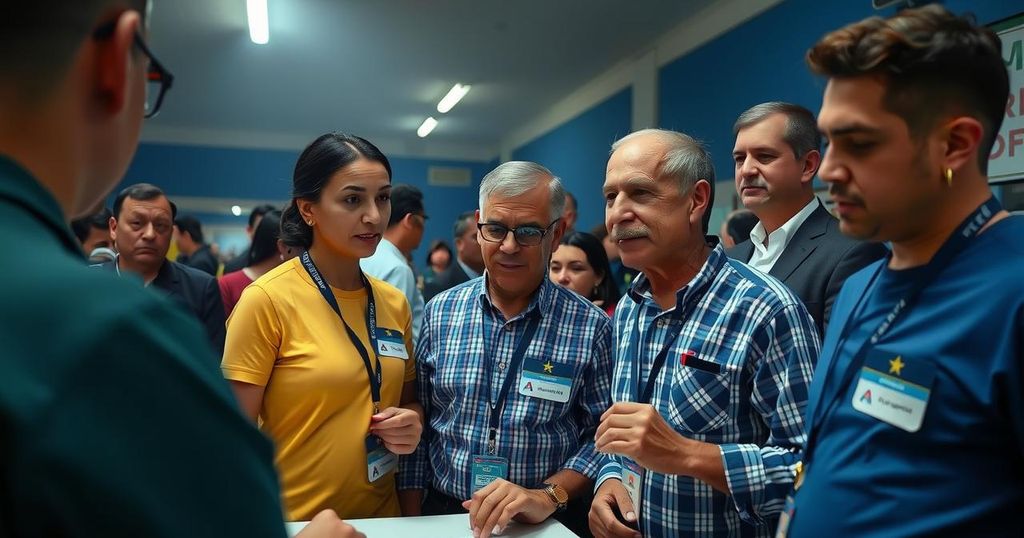Uruguayans Engage in Presidential Run-Off Amid Political Tensions

Uruguayans vote in a presidential run-off election between leftist candidate Yamandu Orsi of the Broad Front and right-wing candidate Alvaro Delgado of the National Party. The election follows five years of conservative governance under President Luis Lacalle Pou, with polls indicating a tight race. Voter uncertainty remains as candidates fail to present new pledges, and socio-economic factors play a critical role in shaping public sentiment.
Voting has commenced in Uruguay for the presidential run-off election, marking a significant political event as the leftist coalition led by the renowned former President Jose “Pepe” Mujica strives to reclaim power after a five-year tenure under a right-wing government. Polling stations opened at 8:00 AM local time and closed at 7:30 PM, with initial results anticipated to be available two hours post-closing. The electoral contest pits Yamandu Orsi of the leftist Frente Amplio (Broad Front) against Alvaro Delgado of the National Party, both vying for the votes of the nation’s 3.4 million people amidst a notably close race marked by opinion polls indicating a potential separation of fewer than 25,000 votes between the frontrunners.
Unlike the sharp political divides observed in other Latin American nations, Uruguay’s political landscape has remained relatively moderate, with both conservative and liberal parties exhibiting overlapping support. President Luis Lacalle Pou, despite enjoying a 50 percent approval rating, faces scrutiny over the government’s performance on crime. Orsi, who previously garnered 43.9 percent of the vote in October, contrasts his approach with Delgado, who received 26.8 percent yet benefits from the conservative Colorado Party’s support, collectively accounting for nearly 42 percent of votes. The absence of any new pledges during the campaign underscores a lack of strategies aimed at swaying the approximately 8 percent of first-round voters who favored smaller parties.
There remains a palpable uncertainty among voters, as exemplified by Rosario Gusque, who expressed confusion following the recent debate. Consequently, as the final electoral outcome approaches, there is growing curiosity regarding whether Uruguay can defy the global trend of declining support for incumbent parties, particularly in the wake of challenges such as inflation and rising living costs that have spurred dissatisfaction globally.
Uruguay is currently engaged in a run-off presidential election, with historical significance as the leftist Frente Amplio coalition seeks a return to power led by the charismatic figure Jose “Pepe” Mujica. This election follows a period of conservative governance marked by President Luis Lacalle Pou’s administration. Notable for its relatively low political tension, Uruguay’s political climate contrasts sharply with the intense divisions seen elsewhere in Latin America. The current electoral context is shaped by socio-economic challenges, particularly inflation and public dissatisfaction, which is being observed as a potential influencing factor in voter behavior during this pivotal election.
As voters head to the polls in Uruguay’s presidential run-off, the contest between Yamandu Orsi and Alvaro Delgado illustrates a critical moment in the nation’s political history. Facing a tightly contested election amid a relatively moderate political environment and socio-economic pressures, the outcome will reveal whether public sentiment can sustain the ruling coalition or favor a return to leftist leadership. The approaching results will provide further insights into Uruguay’s unique political dynamics and voter sentiments in a year characterized by significant electoral shifts globally.
Original Source: www.aljazeera.com







